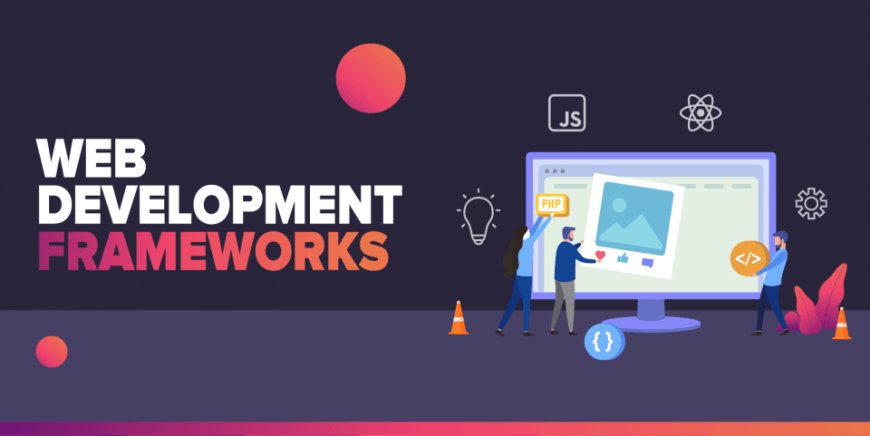Web application development services are increasingly in demand as businesses and individuals seek to create dynamic, interactive, and user-friendly web applications. Whether you're building a small personal project or a large-scale enterprise application, selecting the right tools and frameworks can significantly impact your development process and the quality of your final product. Here are six top tools and frameworks that are essential for modern web app development.
1. React
React, developed by Facebook, is a widely-used JavaScript library for building user interfaces. It enables developers to create reusable UI components, making code more manageable and efficient. One of React's key features is the Virtual DOM, which enhances performance by minimizing direct manipulation of the real DOM.
React is particularly favored for single-page applications (SPAs) due to its fast rendering and seamless user experience. Its component-based architecture allows developers to build complex UIs from simple, isolated pieces of code, which can be reused and tested independently. Additionally, React's vast ecosystem includes tools like Redux for state management and React Router for navigation, making it a versatile choice for web application development services.
2. Angular
Angular, maintained by Google, is a robust framework for building dynamic web applications. Unlike React, which is a library, Angular is a full-fledged MVC (Model-View-Controller) framework. It provides a comprehensive solution with features like two-way data binding, dependency injection, and a powerful template system.
Angular is ideal for large-scale applications where maintainability and scalability are crucial. Its CLI (Command Line Interface) tools streamline the development workflow by automating repetitive tasks and scaffolding new projects. Furthermore, Angular's strong community support and regular updates ensure it remains a reliable choice for web application development services.
3. Vue.js
Vue.js is a progressive JavaScript framework that combines the best aspects of Angular and React. It is designed to be incrementally adoptable, meaning you can use as much or as little of Vue as needed. Vue's core library focuses on the view layer, making it easy to integrate with other libraries or existing projects.
Vue's simplicity and ease of integration make it a favorite among developers. It offers reactive data binding, a component-based architecture, and an intuitive template syntax. Vue's single-file components encapsulate HTML, CSS, and JavaScript, promoting a modular and maintainable codebase. Additionally, Vue's ecosystem includes Vue Router for routing and Vuex for state management, providing a comprehensive solution for web application development services.
4. Node.js
Node.js is a runtime environment that allows developers to execute JavaScript on the server side. It uses an event-driven, non-blocking I/O model, making it lightweight and efficient for building scalable network applications. Node.js is particularly well-suited for real-time applications, such as chat applications, online gaming, and collaborative tools.
One of Node.js's greatest strengths is its extensive package ecosystem, managed through npm (Node Package Manager). With thousands of libraries and modules available, developers can easily extend the functionality of their applications. Furthermore, Node.js's ability to handle multiple concurrent connections with high throughput makes it a popular choice for web application development services focused on performance and scalability.
5. Django
Django is a high-level Python web framework that encourages rapid development and clean, pragmatic design. It follows the "batteries-included" philosophy, providing a wide range of built-in features such as authentication, ORM (Object-Relational Mapping), and an administrative interface.
Django's emphasis on reusability and "don't repeat yourself" (DRY) principles makes it an excellent choice for developers seeking efficiency and simplicity. Its powerful ORM simplifies database interactions, while its robust security features help protect applications from common vulnerabilities. Django's scalability and comprehensive documentation further cement its place as a top tool for web application development services.
6. Ruby on Rails
Ruby on Rails, often referred to as Rails, is a server-side web application framework written in Ruby. It follows the MVC pattern and emphasizes convention over configuration (CoC) and DRY principles, enabling developers to write less code while achieving more functionality.
Rails is known for its developer-friendly environment and focus on rapid prototyping. It includes a wealth of built-in tools and libraries, such as Active Record for database interactions and Action Mailer for sending emails. Rails also has a strong emphasis on testing, with built-in support for unit, functional, and integration tests. This comprehensive approach makes Ruby on Rails a popular choice for web application development services aiming to deliver robust and maintainable applications.
Conclusion
Selecting the right tools and frameworks is a critical step in the web app development process. Each of the six tools and frameworks discussed—React, Angular, Vue.js, Node.js, Django, and Ruby on Rails—offers unique advantages that cater to different aspects of web application development services. By understanding their strengths and aligning them with your project requirements, you can ensure a more efficient development process and a higher-quality end product.
In summary, React and Vue.js are excellent choices for building dynamic user interfaces, with React being particularly strong in performance and Vue.js excelling in simplicity and ease of integration. Angular is ideal for large-scale applications requiring comprehensive solutions. Node.js stands out for server-side development and real-time applications due to its non-blocking I/O model. Django and Ruby on Rails offer powerful back-end solutions with an emphasis on rapid development and maintainability.
Ultimately, the best tool or framework for your project will depend on your specific needs, the complexity of the application, and your team's expertise. By leveraging these top tools and frameworks, you can kickstart your web app development journey with confidence and set the stage for success.



























